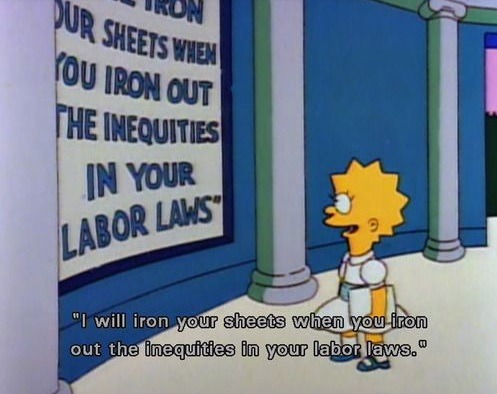I understand what Paul Song was trying to say here, that money in politics prevents politicians from passing progressive policies. I see what he means so clearly, that I was almost ready to write off his use of a word that his almost exclusively directed at women, and used to demean women. At a rally for Bernie Sanders, Paul Song casually and tangentially called Hillary Clinton a whore, and to be very honest, it didn't really shock me all that much.
 |
| You know why Lisa. |
While people prepare their counter-arguments (believe me, I've heard all of them) I'll tell you what the science says. When female politicians are perceived as "power seeking" or ambitious, people are more likely to express feelings or moral outrage, anger and disgust. Power seeking women are seen as uncaring, and voters are less likely to vote for ambitious female politicians. If you're wondering if this is also true for ambitious, power seeking male politicians, it's not. In fact, power seeking men are seen as more competent and believed to have greater agency and assertiveness.
 |
| Amen, sister |
A third study found that when women succeed in male-dominated careers, they are seen as "unlikeable" and "unpleasant." And since 100% of US Presidents have been men, and 80.6% of current Congressional Representatives and Senators are men, it's hard to find a career more male dominated than the highest levels of political office. So it's no surprise that certain female Senators, Congresswomen, female Governors, and Hillary Clinton, are often described as "unlikeable."
 |
| Most of my feminist consciousness came from my mom, the rest came from Lisa Simpson. |
I can’t prove that sexism plays into your dislike of Hillary Clinton.
It’s just that if when you say that she is “sneaky, bitchy, tricky,
bossy, self-obsessed, power-hungry, abrasive, and unfriendly” I can’t
tell if we’re a) doing a cool modern retelling of the Salem witch
trials, b) using every negative descriptor and stereotype that has ever
been applied to women, or c) talking about reasons to dislike Hillary
Clinton.
And to quote myself from two days ago, I can't prove that Hillary Clinton, and other women in politics have it harder because they are women, but I am a woman and I do work in politics, and I know in my soul that there is sexism at play in how we view and talk about powerful women who want to succeed in a male-dominated field.
I'm outraged at the sexist attacks that women in politics face, but I'm not surprised by them. I'm surprised that other people don't seem to see them as sexist. I know that I could link to 100 peer-reviewed studies showing that women in politics are held to a higher standard, and seen as less qualified, I know I could pull up 1,000 tweets criticizing female politicians appearance, or their voices, or their weight, or their amorphous unlikeability, and I know I could talk about my own experiences as a woman in the world, but there would still be people who wouldn't believe me.
So this blog post is to say, I don't need you to believe me, because I know I'm right. I know that women have it harder in politics than men do, I know that if Hillary Clinton was Hector Clinton, Paul Song wouldn't have used the word whore, and I know that this election has been rife with easy to dismiss sexism that makes me feel crazy when I point it out and no one sees it. But I know it's there, and I'll just keep pointing it out until everyone else sees it too.
 |
| Thanks Lisa! |
No comments:
Post a Comment